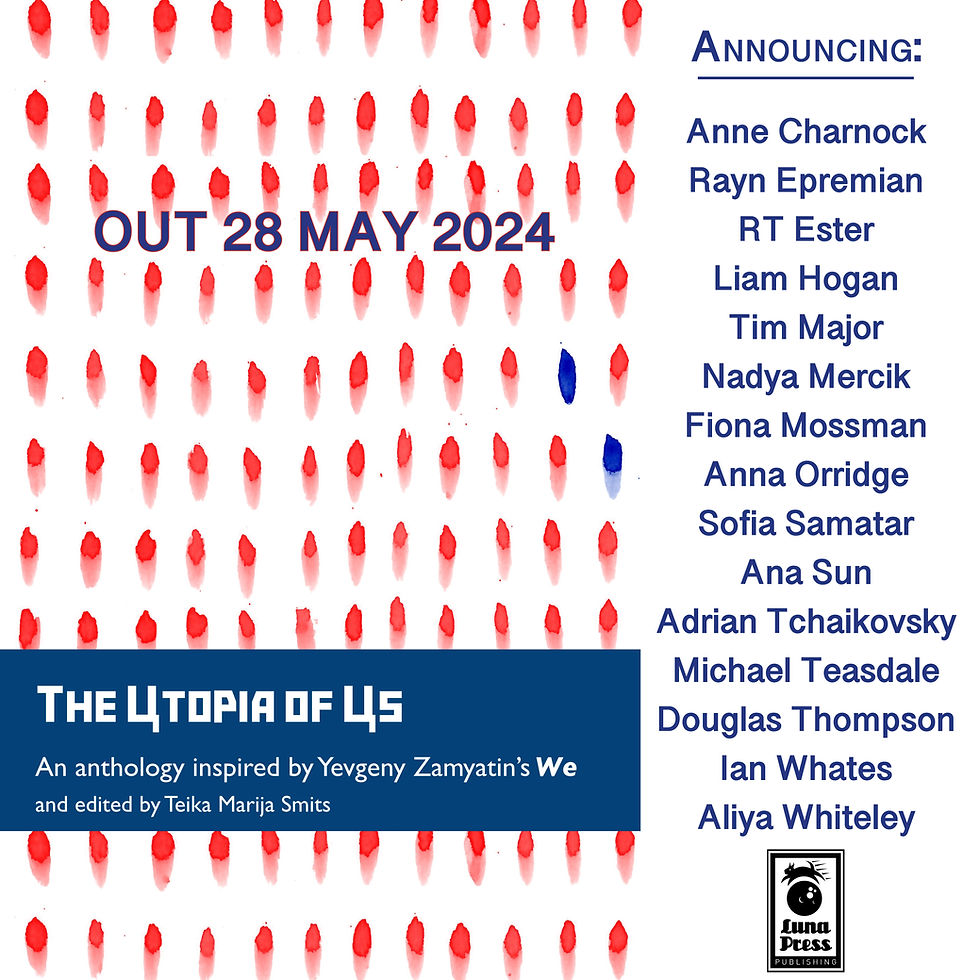
The Utopia of Us anthology is now available for pre-order! Editor Teika Marija Smits has brought together 15 incredible writers and their stories, directly inspired by We by Yevgeny Zamyatin.
It is a charity anthology, and given Russia's current war with Ukraine, royalties from the book will be donated to the Ukraine Humanitarian Appeal.
If you pre-order directly from the Luna website, you will also receive a discount. Check it out!
Today we'd like to introduce you to Sofia Samatar and the story "The Integral – True Literature – Everything Is Blooming".
About the author:
SOFIA SAMATAR is a writer of fiction and nonfiction, including the World Fantasy Award-winning novel A Stranger in Olondria. Her works range from the memoir The White Mosque, a PEN/Jean Stein Award finalist, to The Practice, the Horizon, and the Chain, a science fiction novella about universities, prisons, and breath. Samatar is Roop Distinguished Professor of English at James Madison University, where she teaches African literature, Arabic literature, and speculative fiction.
Sofia on the story:
I’m not sure when I first came across Zamyatin’s We. I feel it was always hovering somewhere in my consciousness, often mixed up with another book, such as Orwell’s 1984, Huxley’s Brave New World, or Ayn Rand’s Anthem. But We is in a class of its own. When I taught it for the first time in a college course on dystopian literature, I was amazed by its quirkiness and freshness. There’s a playfulness and wonder to its use of elements that have now become common tropes in science fiction – walled cities, numbers for names, surveillance, and so on. Of course, there’s also a strong sense of tragedy and political despair. I became fascinated by the figure of Yevgeny Zamyatin, who created, out of deep frustration and suffering, this story that manages to float beyond its subject matter, buoyed by inventiveness, irony, and charm.
For my story, I imagined that Zamyatin’s own papers had been archived in his imaginary city. Perhaps they were lodged in the Ancient House, the museum in We, a favourite spot for the rebellious I-330. My story takes place long after the events of Zamyatin’s novel; I imagine that I-330 escaped and founded a new society outside the walls. My narrator is an archaeologist who has discovered Zamyatin’s papers in the destroyed city and is defending their value to other members of the community. In reality, Zamyatin is the creator of this whole world, but in my story he’s a nameless nobody, a minor figure from the distant past.
What’s valuable about an ordinary little life? This question, which preoccupies my archaeologist, is in tune with Zamyatin’s attention to detail and his defense of the human right to be unproductive, weak, and sick. It was a rich experience to read Zamyatin’s essays and autobiographical writings for this story. I came away with a fuller impression of this artist, who was not only an influential science fiction writer but an uncategorizable revolutionary, an incorrigible eccentric, and a clear-sighted poet of small things.

More on the anthology:
The year 2024 marks the centenary of the first publication of We, the direct inspiration for George Orwell’s 1984, and many other novels, such as Ursula K. Le Guin’s The Dispossessed and Kurt Vonnegut’s Player Piano.
Strikingly, the Russian novel was first published in English, and in the US. Indeed, it wasn’t until 1988 that it was published in the author’s native country. Clearly, this was a book that the people in power in the Soviet Union wanted erased. Yet it ushered in a new genre – the future dystopia – and in doing so gave birth to the many dystopian novels and films which have found their way into our popular culture.
Setting aside what its publication history says about Russia’s past, it also happens to be a beautifully written and page-turning novel, and one that is still currently relevant since it speaks to the very heart of what it means to be human. In short, the centenary of this wonderful novel should be, and needs to be, celebrated, and how better to do that than by a globally minded, independent press, publishing an anthology of science fiction stories inspired by We?

Comments